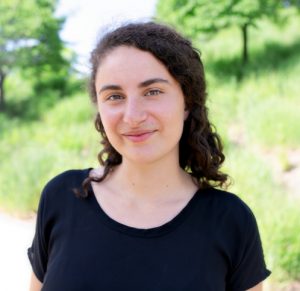
UNC Alumna Hannah Factor was named one of 80 research fellows to contribute to the American Voices Project (AVP) launched by the Stanford Center on Poverty and Inequality, in partnership with Princeton University’s Center for Research on Child Wellbeing and the American Institutes for Research. This project encompasses 15 research areas that address important poverty-relevant measurement problems facing the nation. Hannah graduated from UNC in 2019 with a double major in Economics and Public Policy and immediately began applying her studies to this project, which will continue through this summer (June 2019- July 2020).
About the American Voices Project
The 10-year project launched by Stanford University focuses on qualitative conversation about the hopes and needs of Americans in over 5,000 households, in 200 communities, across 50 states. According to the project website, “this is not a standard survey but a commitment to listen.” The projected aftereffect is to yield ideas that will effect change in policies to improve our local, state, and national community.
Hannah’s Perspective
As part of this program, I completed training in public policy, qualitative interviewing techniques, and survey methodology at Johns Hopkins University in Baltimore during June and July of 2019, learning from top scholars across social science disciplines to prepare for this coming year. Now in rural Alabama, I am spending my year traveling across urban and rural communities in the South, with a focus on Appalachia.
How did your classes as UNC provide you with a foundation for the experience you had at the Center? Was it the course content, the instructors, the theory, the theoretical applications?
I never planned on being an economics major. My first semester at UNC, I knew ECON 101 was a prerequisite for a lot of social science majors that I might be interested in and decided to take it. I recall walking into Rita Balaban’s 400-person class my first day of college: I was immediately intimidated. Being in a college-level lecture hall where people presented confidence and academic assuredness kicked in my feelings of imposter syndrome. I honestly never thought I would be an economics major.
I quickly learned that Econ 101 wasn’t all about understanding finance or business, and pretty quickly, people weren’t exuding as much confidence as they had that first week. Things became harder as it became about problem-solving for optimal allocations under a system of tight resources. It is a concept that I still very much believe is important to understand in order to work towards collective goals. Those skills, along with the breadth of inquiry is what kept me in economics, and what got me through the 400-levels as well. It also led me to be an ECON ULA (undergraduate learning assistant) for Dr. Balaban’s 101 class, helping other students who felt similar to me my first semester. I also became a peer tutor in the EconAid Center.
My Econ major, along with public policy double major, has translated well into a research fellowship looking at domestic economic and social inequality. Over the course of my year, I’ll be learning from people who are experiencing varying degrees of abundance and scarcity across a whole spectrum of assets, regions, and religious beliefs, and more.
What gap did this fellowship bridge or fill in (over and above your coursework) in your pursuit of an education in economics?
Thanks to the work of economists like Raj Chetty, who statistically explores the American dream using longitudinal tax data, we know the decline in American economic mobility by the numbers, the frequency, and the degree of its decline over time. We know the likelihood that someone born poor in a particular zip code will one day earn at the highest rung of the American income ladder. What we miss in those predictive numbers is the infinite contexts that shape people’s lives and stories.
I joined AVP to develop a deeper understanding of people’s life stories, barriers and successes that often translate into economic outcomes. I’m very excited to continue my own education by learning directly from people who are experiencing inequity, and not just learning about it through theory or in a classroom.
What are your next steps?
I am looking to pursue a career at the intersection of social enterprise and economic development and later plan on pursuing a master’s degree in Public Policy, Business or Urban Planning. My ultimate goal is to use a cross-sector approach to further equitable economic development and improve economic mobility at a community level.
Learn more about:
Hannah Factor: linkedin.com/in/hannahlfactor
American Voices Project: americanvoicesproject.org
Stanford Center on Poverty & Inequality: inequality.stanford.edu/research
To learn more about Hannah Factor: https://www.linkedin.com/in/hannahlfactor/; American Voices Project: https://americanvoicesproject.org/; Stanford Center on Poverty & Inequality: https://inequality.stanford.edu/research